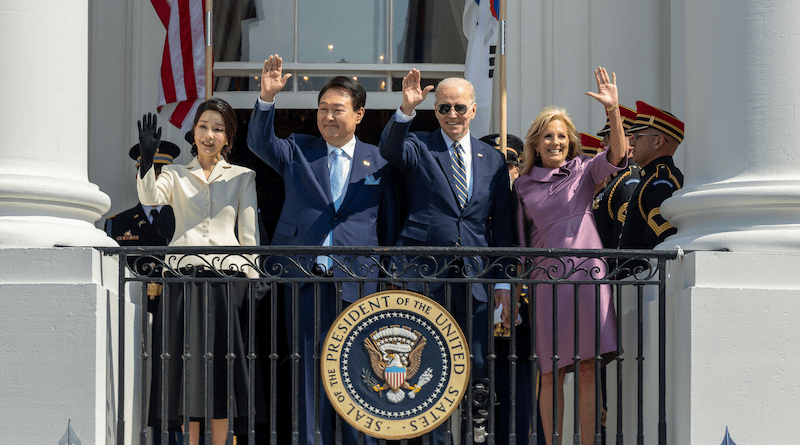US-South Korea: Old Allies; New Commitments – Analysis
By IPCS
By Dr. Sandip Kumar Mishra
South Korean President Yoon Suk-yeol made a six-day state visit to the US in April 2023, to mark the 70th anniversary of South Korea’s alliance with the US. The Mutual Defense Treaty between the two countries has been the backbone of South Korea’s security calculus since its inception. In fact South Korea’s story over the past seven decades can’t be narrated without underlining the abundant US support and assistance in almost every possible domain. It is interesting to note despite some changes in roles, financing, numbers, and degree of commitment, the alliance has survived the test of the time. In the most recent Washington Declaration, the US has overtly committed its extended nuclear deterrent to South Korea.
In the initial decades, South Korea was a junior partner in the alliance, and support and assistance was unidirectional. Gradually, however, South Korea has emerged as a remarkable economic and technological power, and bilateral relations between the two countries have become more equal. For the same reasons, the number of US troops stationed in South Korea has gone down, and the Combined Forces Command (CFC) is now under South Korea’s command. There are also occasional discussions about further reducing US troop presence, or even handing over the CFC’s war-time command to South Korea. These haven’t however been realised yet because it may signal a dilution of US’ commitment rather than greater South Korean autonomy over its security. On that note, while South Korea now has autonomy in its foreign policy, its security needs are still considered to be better served by dependency on the US.
The alliance has also seen some big changes in the region in the past seven decades, such as normalisation of US-China relations, the end of the Cold War, the rise of an ‘assertive’ China, and North Korea becoming a nuclear and missile power. Through all these developments, the US and South Korea have maintained a close relationship. South Korea has sought autonomy on foreign policy issues on a few occasions, but generally, it has not challenged broader US regional interests.
This period has also seen a few phases where South Korea has feared US abandonment, but efforts by both countries have helped overcome these crises. For instance, one of the latest crises for the alliance surfaced during the Donald Trump administration, which was generally ‘transactional’ in most of its bilateral relations. The Trump administration demanded that South Korea share the cost of US troop presence and demanded a five-fold increase in its contribution. Although Seoul resolved the issue by increasing its spending by 14 per cent, it did create doubt about the resilience of US commitment to South Korean security. Moreover, the US was also less than satisfied with South Korea’s reluctance, under the Moon Jae-in government, to announce an Indo-Pacific strategy.
Since the inauguration of a new administration in May 2022, however, South Korea has shown an overt tilt towards the US. The Yoon Suk-yeol administration has been in agreement with all US priorities. In the past, South Korea has periodically prioritised its economic partnership with China as being very substantial, which it felt would be compromised by an overt and public alignment with the US. The new South Korea administration, however, considers its alliance, bilateral exchanges, and commitments with the US non-negotiable. It believes that South Korea must be ready to face the consequences of such proximity, if need be.
Further, unlike the Moon Jae-in administration, Yoon Suk-yeol feels that inter-Korea relations should also not be prioritised over South Korea’s relations with the US. Consequently, Seoul appears to want a better coordination of policy with the US, which has generally insisted on linking improvement in US-North Korea relations or South Korea-North Korea relations with denuclearisation.
In the Washington Declaration, the US and South Korea have both clarified that their alliance is going to be further strengthened, and that it encompasses the US security commitment to South Korea in an age of North Korean nuclear and missile developments. Furthermore, the Washington Declaration mentions the setting up of a Nuclear Consultative Group (NCG) through which Seoul would have more control over nuclear response-related planning and coordination. It also promises better bilateral coordination approaches towards North Korea through regular dialogue and communication.
Overall, it appears that on the 70th anniversary of the alliance, Washington and Seoul have repaired their relations and commitment to each other. This is indeed a positive development. It would be premature to say, however, whether this improvement is also going to enhance South Korean security, because the country’s more overt alignment with the US may jeopardise its relations with China and North Korea.
*Dr. Sandip Kumar Mishra is Associate Professor, Centre for East Asian Studies, SIS, JNU, & Distinguished Fellow, IPCS.

